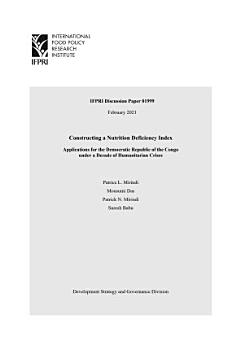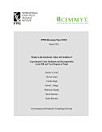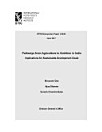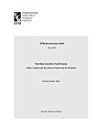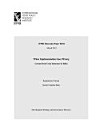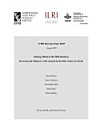Constructing a nutrition deficiency index: Applications for the Democratic Republic of the Congo under a decade of humanitarian crises
Mirindi, Patrice L. · Das, Mousumi · Mirindi, Patrick N. · Babu, Suresh Chandra
2021 թ. փտվ · IFPRI Discussion Paper Գիրք 1 · Intl Food Policy Res Inst
Էլ. գիրք
50
Էջեր
family_home
Կարելի է ավելացնել
info
reportԳնահատականները և կարծիքները չեն ստուգվում Իմանալ ավելին
Այս էլ․ գրքի մասին
The Democratic Republic of the Congo (DRC) is perennially plagued by prolonged phases of poverty, conflict, and increased internal migration, as well as pandemic outbreaks such as Ebola and COVID-19, and limited livelihood opportunities. Such unexpected or catastrophic events have rendered households vulnerable and resulted in poor health outcomes. Given this background, we intend to analyze the nutritional profile of households for a period spanning almost a decade using the Household Consumption Expenditure Survey (HCES). We construct a composite nutrition deficiency index (NDI), capturing intake of 14 different macro- and micronutrients (which we refer to as dimensions)—namely, calories, protein, calcium, zinc, folate, thiamine, niacin, iron, vitamin A, vitamin B12, vitamin D, vitamin B6, vitamin C, and vitamin E—using the popular Alkire-Foster methodology. This methodology, usually used to construct multidimensional poverty indexes, in this case helps measure the incidence, intensity, and combined extent of multinutrient deprivation. DRC’s values on the multidimensional NDI vary regionally from 0.13 to 0.73. Urban DRC performs worse than rural DRC. Regions subject to the conflict and Ebola crises are the worst-affected of the nutritionally deprived regions. Deficiency in calorie and protein intake contributes to the highest values of the NDI, but we also find evidence of a double burden of malnutrition, with households lacking consumption of both macro- and micronutrients. South Kivu is the worst-performing of all regions and Mongala the best. The northern parts of DRC have fewer nutritionally deprived households, as compared with the central and southwestern parts. Our main policy recommendation is to help improve market access in urban areas so that people consume a more diverse diet. In rural areas, the government should support improving nutrition-sensitive agricultural production. Although the World Food Programme has a sustained presence in the country, uplifting households from severe hunger, active participation by the government and collaboration with multiple stakeholders is called for.
Գնահատեք էլ․ գիրքը
Կարծիք հայտնեք։
Տեղեկություններ
Սմարթֆոններ և պլանշետներ
Տեղադրեք Google Play Գրքեր հավելվածը Android-ի և iPad/iPhone-ի համար։ Այն ավտոմատ համաժամացվում է ձեր հաշվի հետ և թույլ է տալիս կարդալ առցանց և անցանց ռեժիմներում:
Նոթբուքներ և համակարգիչներ
Դուք կարող եք լսել Google Play-ից գնված աուդիոգրքերը համակարգչի դիտարկիչով:
Գրքեր կարդալու սարքեր
Գրքերը E-ink տեխնոլոգիան աջակցող սարքերով (օր․՝ Kobo էլեկտրոնային ընթերցիչով) կարդալու համար ներբեռնեք ֆայլը և այն փոխանցեք ձեր սարք։ Մանրամասն ցուցումները կարող եք գտնել Օգնության կենտրոնում։
